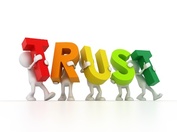|
One of the most popular issues people want to address in coaching with me is to learn how to trust others again. We discover in our sessions together that the lack of trust stems either from issues growing up or perhaps experiences with painful relationships. Once we know where the mistrust started, we then take a look at the pros and cons of trusting self and/or others. Doing this allows one to see where mistrust can be hurtful and how learning to trust self and others can be rewarding in social, intimate and professional relationships.
In my case, I am fully aware of the reasons for my lacking trust in others. It started during my childhood and continued into adulthood. In looking back at past relationships either personal or professional, I realized how emotionally painful and exhausting it was not to trust others. Like those who seek out my coaching services, I wanted relief from the consequences of not trusting others. So here are some things I ‘ve learned along the way in developing the ability to trust myself and eventually others: 1. Trust yourself first: This one was a tough one to do.I had to look closely in my life where I was not honoring those things I wanted to do.I realized that I was not being trustworthy to myself by not fulfilling those promises I wanted to accomplish. Eventually I took very small steps by making easy promises that I could achieve.This led to making bigger goals and feeling empowered about doing those things that were important to me. Try it yourself.Start with small goals and work towards the bigger ones. Once you learn how to successfully create the habit to trust yourself you will find it much easier to know who you can and cannot trust. 2. Practice speaking your mind: Communicating your needs and feelings is important.In looking back at most of my personal and professional relationships, I discovered that communicating my needs was not easy to do.In fact, a majority of the relationship conflicts stemmed from inability to communicate effectively. Eventually, after practicing very simple communication skills and tools, I was able to speak with confidence in my relationships at home and work. It is a very liberating feeling to speak up for myself in a way that is not upsetting. 3. Draw lines in the sand: Letting others know that you will not tolerate unhealthy behaviors is creating boundaries.Setting emotional and physical boundaries was about taking care of myself.At first I was afraid to set boundaries but learned that in doing so, I was taking care of myself by letting others know I care about my well being. 4. Get a mental make over: In other words, change the way you think about yourself and your relationships.If you believe that you will never trust others again then you will likely either be alone or in relationships that are unhealthy.I discovered that my negative thinking habits were contributing to a great deal of my relationship conflicts both at home and work. Having self doubt and little confidence about my ability to be in relationships was no longer working for me.I bought some helpful books and learned practical tools in my sessions with my coach.One of my favorite quotes is “The root of all suffering is in the mind”. Accept where and how your thinking may be harmful and seek out new habits of thinking positively. If you want to know how a life coach can help, let me know.My coach was amazingly helpful. 5. Be accountable to yourself: Growing up with no self-confidence, I habitually sought out others’ opinions on what I should do with my life’s circumstances. I did not believe in my own ability to make healthy choices in my life. When things went wrong in my life, I blamed others and took no responsibility for my actions. This vicious cycle of depending upon others did not produce the fulfilling life I wanted. I had to learn how to trust and be accountable for my own life. So with simple tools, I learned that who I wanted to be in life had to come from my heart not from other people. Today I am very thankful I have learned to be accountable for the fulfilling peaceful life I desired. 6. Be gentle with yourself: Life can be difficult. It is important during those trying times to be kind and loving towards yourself. Remind yourself that you are on a journey and accept that there may be bumps along the way. Learning to be kind and gentle to yourself enables you to do the same for others in your life. 7. Practice, Practice & Practice: As with any new ideas, beliefs or tools, we need to apply them in our lives repeatedly in order to develop healthy trusting behaviors. In my sessions with my life coach, I was reminded to commit to applying the tools I have learned so I can develop the ability to trust myself. When I am able to trust myself my ability to trust others will follow. The ability to trust oneself and others is vital to living the life you desire. As I have learned with my own experiences, it was nearly impossible for me to live a happy and fulfilling life without trust in myself and others. I will not kid you, learning to trust again can be scary but continuing to live life without trust is much more costly and painful. So I ask you if you were dealing with trust issues, if you knew that there were steps towards learning to trust, would you take them? What are you willing to do to learn how to trust yourself? If you find this post helpful, share it with others who may need to deal with trust issues.
1 Comment
|
Tom Ellis, CPC
Tom is a Path Finder who is solution & action focused as well as a Life Purpose Specialist. Artist & Gentleman Farmer.
|



 RSS Feed
RSS Feed